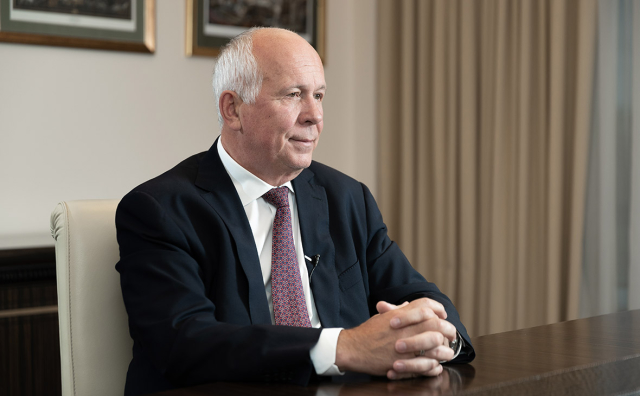The eternal dispute between pessimists and optimists has spread to the sphere of import substitution. Some point to examples of the critical dependence of the Russian economy on imports, not noticing the positive. Others look at the obvious achievements of the industry, avoiding problematic issues. Often, both sides are quite far from the true state of affairs. This is where the polarity of opinions arises: from "everything is gone" to "dizzying successes".
Let's remember that until recently Russia lived in a completely different world. In a world where globalization and free market rules were of fundamental importance. The world's largest companies, including Russian ones, lived by these rules. Rostec was a part of global cooperation and acted as a partner of such giants as Daimler AG, Renault, Boeing, Pratt & Whitney, Safran and many others.
For our country, which practically lost its industry in the 1990s, this cooperation has given a lot. It gave us quick access to advanced technologies, the best world experience and international markets. Thanks to him, we carried out technical re-equipment at the highest level and were able to quickly create new products: airplanes, helicopters, cars, medical devices, pharmaceuticals, etc. Therefore, we were able to achieve rapid results where in other conditions it would have taken decades.
In partnership with leading foreign companies, we have created modern cars, Superjet and MS-21 airliners, Ansat and Ka-62 helicopters and other modern products. I emphasize: they did not borrow, but created. We were engaged not in "screwdriver" assembly, but in full-fledged development and production. International participation does not negate the merits of our scientists, designers, and other specialists. Their great work can only be overlooked by amateurs.
In the former reality, where Russia was part of the international system of division of labor, this was not a dependency, but an obvious norm. Let's be honest: are Germany, Japan, France, Australia or Canada independent of foreign goods and technologies? American iPhones are assembled in China from Asian components. More than 50 countries of the world participate in the production of "Boeing".
There are many areas where these countries use borrowed solutions, including Russian ones. Because economic expediency dictates so. Then why should Russia have been an exception? And why is an iPhone with an Asian filling an American pride, and our passenger plane, which carries 30 million passengers a year and whose device is hundreds of times more complicated, with partner components is perceived as a "national disgrace"? Why such disregard for Russian and what is wrong with our sense of pride?
It is important to understand that the destruction of cooperative chains and, in general, the shock scenario that our country is facing today have nothing to do with normal economic processes. Sanctions are a politically motivated instrument of aggression. Foreign partners are breaking off relations with Russia with colossal losses for themselves, against their will and common sense, because the authorities of the United States and allied countries decided so. As a result, the principles of free trade are crossed out in favor of politicians. The existing Western economic and political institutions are forever discredited in the eyes of not only Russia, but the whole world. But they will realize it a little later.
I am sure that even the most "import-independent" economy in the world would not survive in similar conditions. But Russia was waiting for something like this and largely managed to prepare.
Of course, there can be no illusions here. We did not have time for everything - there was too little time, because the same path took decades for Western countries. Take for example the American aviation dual-circuit engine PW1400G. It began to be developed in 2001, and only in 2016 it went into production. That is, 15 years have passed from the project to the "series". For comparison: the PD-14 program (engine for MS-21. - RBC) started in 2008, and in October 2018 the engine has already received a certificate.
Let me remind you that there are only four countries in the world that are capable of creating modern turbofan engines in a full cycle: the USA, Great Britain, France and Russia.
Of course, there is an understanding that the main difficulties are still ahead of us. But I was, am and will be an optimist. Why?
First. The economic sustainability of the industry today is disproportionately higher than 15 years ago. When Rostec was created, almost half of our enterprises - and these are hundreds of factories, research institutes and design bureaus - were in crisis. There were huge problems with the production of civilian products and sales. In 2009, the revenue of our companies amounted to about 500 billion rubles, the main part of it was formed by the state defense order. Today we are different. Rostec's revenue in 2021 is more than 2 trillion rubles, that is, an increase of almost four times. At the same time, 45.5% of income is now provided by civil production.
Second. Over the past years, we have managed to significantly re-equip ourselves technically. If we compare our workshops then and now, there is a big difference. For a long time, our companies have been systematically updated. Last year alone, we completed over 70 modernization projects. In particular, the production of helicopter engines in St. Petersburg and optical industry enterprises in the Vologda and Novosibirsk regions have been re-equipped. Dozens of innovative technologies have been introduced into production, without exaggeration. For example, the technology of manufacturing aircraft engine parts by direct laser cultivation. Every new technology - and hundreds of them have been mastered over the years - is a new opportunity for our factories. The main result of this work is that the Russian defense industry and the industry as a whole have risen from their knees in 15 years.
The third. All this time, we have invested heavily in research and development work. Last year - about 170 billion rubles. As a result, our companies have developed product lines today, and the desire to ensure technological sovereignty has brought tangible results. Already textbook: the domestic "black" wing for the MS-21 (the liner itself is designed to replace classmates from Boeing and Airbus), gas turbine power plants for the Navy, the PD-14 aircraft engine, the high-power turbine GTD-110M for power engineering. There are many such examples. Each of these projects is the result of many years of work. The results of this work are too obvious to deny.
Someone will object that the same MS-21 or Superjet will not fly without foreign engines. The answer is obvious: replacing the unit with a domestic one is faster than creating a new aircraft from scratch. By the way, the MS-21 with domestic power plants is already in the process of testing today. The PD-8 engine is also making good progress: next year we plan to show the Superjet in a new look, without Western components. Planes will fly, no doubt.
Fourth. There is a lot of talk now that the current crisis is a "window of opportunity." Indeed, the current situation stimulates the development process and the search for new growth points. But I see the "window of opportunity" not only in this. First of all, I want to believe that what is happening will change the attitude of consumers to Russian. And finally, in a dispute with Boeing, a domestic aircraft will win, and a procurement specialist somewhere in a regional hospital, choosing between an imported medical device and a domestic one, will stop putting sticks in our manufacturer's wheels.
To have your own, you need to buy your own - there is no other way. For several years in a row, we have warned the largest airlines about the risks of using foreign booking systems. But they didn't listen to us. Now, when foreign suppliers are breaking off relations and the industry is facing the threat of collapse, airlines are in a hurry to get involved in our development. But why couldn't it have been done two years ago?
In the current conditions, the main thing is to keep a sober mind and realize the scale of the tasks facing us. Yes, the restrictions imposed are unprecedented. Yes, at the moment we lost access to certain goods, technologies, components. But this is not a signal for total import substitution. Replacing everything is pointless, economically impractical and simply impossible. I repeat, no developed country in the world does this.
Isolation, including technological isolation, and trying to do everything on your own is a way to nowhere. Russia must remain part of a global world where development is impossible without international partnerships. The betrayal of the West is not a reason to close windows and doors. We are not on the path with the agents of sanctions, but we have partners in other regions of the world who are behaving consistently and fundamentally today.
Based on this, a step-by-step action plan for the near future should be based on the answers: what specific goods and technologies determine dependence on imports today? Are there parallel import paths or alternative providers? How long will it take to do it yourself?
I will give an example of KAMAZ. After the departure of the European partner, the plant needed to replace about 250 components in the shortest possible time. About 220 positions were localized in just a month, and other suppliers were found for the remaining 30. As a result, the plant is working today, by the end of the year the production of new generation K5 trucks will resume without the participation of former Western partners. Of course, this is a good result. And a clear answer to those who say today that we ourselves "can't do anything."
In the field of critical technologies affecting national security, the need for technological sovereignty is obvious. The most promising areas here are civil aircraft construction, energy and heavy engineering, oil and gas equipment, instrument making. The development of these industries has a huge multiplier effect. It is on them that the organizational and financial efforts of industry and the state should be concentrated as much as possible.
What else is important? There can be no "dizziness from success", "shapkozakidatelstvo" and promises "to do everything tomorrow". There's a lot of work ahead. We will solve some problems quickly, some will take a year or two, and some will require much more time. Therefore, it is necessary to clearly prioritize and understand what is needed here and now, and what will wait. This is how I see "smart" import substitution.




